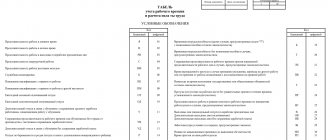Hello! In this article we will talk about the rational use of working time.
Today you will learn:
- How to plan working time and how to use it wisely;
- What is meant by the term “rational use of working time”;
- What results can be achieved if you prioritize correctly.
Content
- Staff working time and efficiency
- Factors influencing the effective use of time
- What is the priority
- Methods for implementing time management
- Factors that distract from the main work
- How to stop getting distracted
- How can a manager rationally organize working time?
- Staff motivation
- Conclusion
According to studies, a very large part of people do not know how to plan their working time. It turns out that even when working according to a strict schedule, people do not have time to complete the amount of work. In such situations, rational use of working time helps. This is what we will be talking about today.
Information on staff working time efficiency
Many studies have shown that most people use their time irrationally. Even creating a strict schedule does not contribute to one hundred percent effectiveness and increased productivity. By planning too many things, you can often end up not getting anything done at all.
Working time is the period during which personnel must perform their duties at work. Only efficiency during each task determines how quickly and efficiently you can complete all duties.
Tips for rationally planning your working time are presented in this video:
Time efficiency factors
The most important factors should be highlighted, namely:
- Correct working hours;
- The process of organizing work activity;
- Level of staff performance;
- Ability to plan working time.
What should be the priority
The result is the most important element in any work activity, as it determines the achievement of all goals and objectives. It is the alignment of the work process that will help you achieve the planned result.
There are several principles of rational planning that are very often introduced into the work process.
Methods for implementing time management
Time management is a phrase that means nothing to many people. Therefore, we will simplify it somewhat and clarify that it includes organizing working time and increasing the efficiency of its use.
It is worth listing the positive aspects of this tool:
- There is a favorable and calm atmosphere in the team;
- Increases stress resistance of employees;
- The level of performance of each employee increases;
- The level of personal responsibility and self-organization increases.
Planning work time.
Every entrepreneur has heard about this tool at some point. But not everyone knows how to apply it in practice. As a result, time is simply lost, but it is irrevocable, it cannot be accumulated and returned back. There are simple ways to plan that do not require huge expenses.
Let's look at the planning process step by step.
It is better to plan the coming working day the night before. At this time, you can analyze what has already been done, and also draw up a plan taking into account all important circumstances. For planning, you can use both the old proven notepad and modern gadgets. It is important that you see which tasks have already been completed and which are yet to be completed.
You still won’t retain all the information in your head, but you may well forget something important. So write it down.
Setting priority tasks.
This is a very important point in planning. You can implement it simply: on a piece of paper, draw a square, which needs to be divided into 4 more squares.
Then scatter all the tasks that need to be completed into 4 points:
- Urgent and important;
- Urgent and unimportant;
- Non-urgent and important;
- Not urgent and unimportant.
This way, all the tasks will be before your eyes every day and you will see what needs to be done first, and what can be postponed for a couple of hours, or maybe days.
Setting goals.
Any successful entrepreneur understands that setting goals is a condition for achieving good results. However, often managers do not explain to employees what the company's goals are, what each of them must do to achieve success.
As a result, people do work that is mostly meaningless and brings no practical benefit to anyone. And all because they simply don’t know why this is needed at all. How can this situation be changed?
- Clearly formulate what the company’s goals are and why they need to be achieved;
- Explain to employees how important the functions they perform are to achieving the overall goal: people need to understand that their work is important and beneficial;
- Record the goals that were achieved and the results of each employee.
Correctly set goals motivate employees and increase their performance.
Pareto's law.
Its essence is the following principle: if you spend only 20% of the effort, you will get 80% of the result. At the same time, it is important to exclude all unnecessary tasks from the list and focus only on the important ones.
Summing up and working on mistakes
Here's another profitable investment. At the end of the “reporting period” (this could be a day, a week or a month - depending on the field of your professional activity), make a stop. Set aside an hour of time to analyze the results of the work done: what goals were set and what goals were achieved? What obstacles prevented you from achieving the rest? What is needed for more efficient work (knowledge, technology, money, contacts, etc.)? It is better to write down the results briefly on paper. By the way, working on errors can be immediately combined with planning for the new reporting period.
Factors that distract from the main work
Most of them are simply the root of evil in any company, from large holdings to small firms. Therefore, we will pay special attention to them.
Stressful state.
Every person at least once in his life has been in a state when work simply does not come to mind. It is difficult to concentrate at such moments. Drink some herbal tea and get to work.
State of fatigue.
To be productive at work, get enough sleep. Lack of sleep has a bad effect on the general condition of the body.
Social network.
A real horror for any employer. Employees constantly check their page during working hours, read posts, but do not concentrate on work at all. Therefore, management has to resort to radical measures: prohibit access to the Internet by written order, and then check the visit log of each employee. Although it doesn’t always help either.
Cellular telephone.
If you don't expect urgent calls, just turn off the sound.
Multitasking mode.
When an employee tries to complete many tasks at one time, a failure occurs and nothing happens. To prevent this from happening, organize your working time correctly.
Feeling bored.
One of the most dangerous factors. If a person is bored, it is natural that he will look for a way to escape from work. Stimulate your interest in work: for example, if you submit a report ahead of schedule and receive a bonus, you will be able to make a purchase that you have long dreamed of.
Hunger.
It may seem strange to some, but if you are hungry, you won’t be able to work normally. There is only one thought in my head: when will I eat? To prevent this from happening, have snacks and watch your diet in general.
How to stop getting distracted
To work productively and efficiently, you need to get rid of the habit of constantly being distracted. Colleagues, gadgets, and just thoughts can distract you. How to become the ruler of your time, we will discuss further.
Get rid of time wasters.
Try not to be distracted by personal matters or extraneous conversations during working hours. In addition to the fact that your time is spent browsing the next website or talking on the phone with a friend, you will also incur time costs to get involved in the work process again.
Of course, you need to take breaks from work. We are not robots, there must be rest. But a specific time must be allocated for this.
Another simple tip: leave home problems outside the office. This will only be for the good. It is necessary to separate personal problems and work process.
Don't be distracted by your colleagues too often.
Imagine: you are completing a complex task or writing a lengthy report that needs to be submitted in the near future. And you’re so afraid of not being on time, and then your colleague asks unnecessary questions. They may be within the scope of work, but it is catastrophically at the wrong time.
If you have to work in a noisy environment, still distribute the work so that you are not constantly distracted. If you know for sure that you won’t be able to concentrate, try changing your office for a while. The measure is effective if appealing to the reason of colleagues discussing a new film is useless.
Do some planning.
Write down all the things that need to be done. And look through this list from time to time. You can set a reminder in your phone that will help you not to forget something important.
Distribute all work by time of day. Perform the most difficult tasks in the morning and evening, and during the day, when you can be distracted at any moment, do those tasks that do not require particularly serious attention.
Send correspondence or check email in batch mode.
Instead of being distracted every hour, set a specific time to check the contents of your email inbox. And if you need to send several faxes, collect them throughout the day and send them all at once.
In the next part of our article, we’ll talk separately about organizing the manager’s working time.
Video about making a map for the day
Benjamin Franklin, the author of the famous aphorism “Time is money,” also noted the following: Wealth depends mainly on two things: on industry and moderation, in other words, waste neither time nor money, and use both in the best possible way.
The modern form of making plans for the day is special programs for smartphones and PDAs (organizers), which take the calendar or spreadsheet capabilities as a basis, which allows you to reflect the date, time, indicate the time frame for each event, leave notes and comments, and also create not only tactical plans for the day, but also to see strategic movement towards the main goal. They are mobile, convenient and, most importantly, effective in modern living conditions.
How can a manager rationally organize working time?
Do you manage to get everything done in a working day? If not, then you represent the vast majority of managers. A number of analysts have studied the working hours of the average manager. The findings were disappointing: only 8% out of 100 implement all their plans during the day.
The reasons for this are as follows:
- Rush;
- Lack of time planning;
- Improper organization of work;
- Low level of motivation.
Lack of planning can be considered the main reason. If working hours pass chaotically, it is logical that things cannot be completed.
Formula 60:40.
If you follow it, then the part of the working time that you plan should not exceed 60% of the total working time. This is a period of planned activity.
The remaining 40% of the time should be divided into 2 parts, the first is reserve time for unplanned work, the remaining 20% is allocated for management work.
Thus, if you plan your working time correctly, you can significantly gain time. This means there will remain the opportunity to engage in self-education and fruitful activities.
Staff motivation
Motivation is important for everyone: you are a manager or an ordinary employee. When setting goals for a day, a week, a month, you need to understand what the result will be. Motivation is an excellent tool for increasing the performance and efficiency of staff. In this case, you can use both motivation in material and intangible terms.
Example. The management of a large oil company in the Russian Federation has set a goal: to create a solid business reputation, while involving employees in this process. A motivation system was developed, which implied the following: if within six months all departments of the company fulfill the tasks assigned to them and at the same time exceed the plan, employees will be offered bonuses of a choice of material or non-material nature.
As soon as the system was implemented, staff turnover decreased by 20%, and employee loyalty to management increased by 50%, becoming almost 100 percent.
Priorities
Often, postponing important things “for later,” we take on solving secondary tasks, and leave the most important things unfinished, experiencing internal anxiety and discomfort.
“Always try to correctly prioritize your tasks,” advises Sergei Teplov, General Director of the Strogino Technopark. “When organizing activities, take into account the punctuality of external contractors, so that if there is free time while waiting, tasks of secondary importance can be completed.” At the same time, it is necessary to always leave time for flexible planning, the expert adds. If you value other people's time, you have a chance of getting favorable results.










